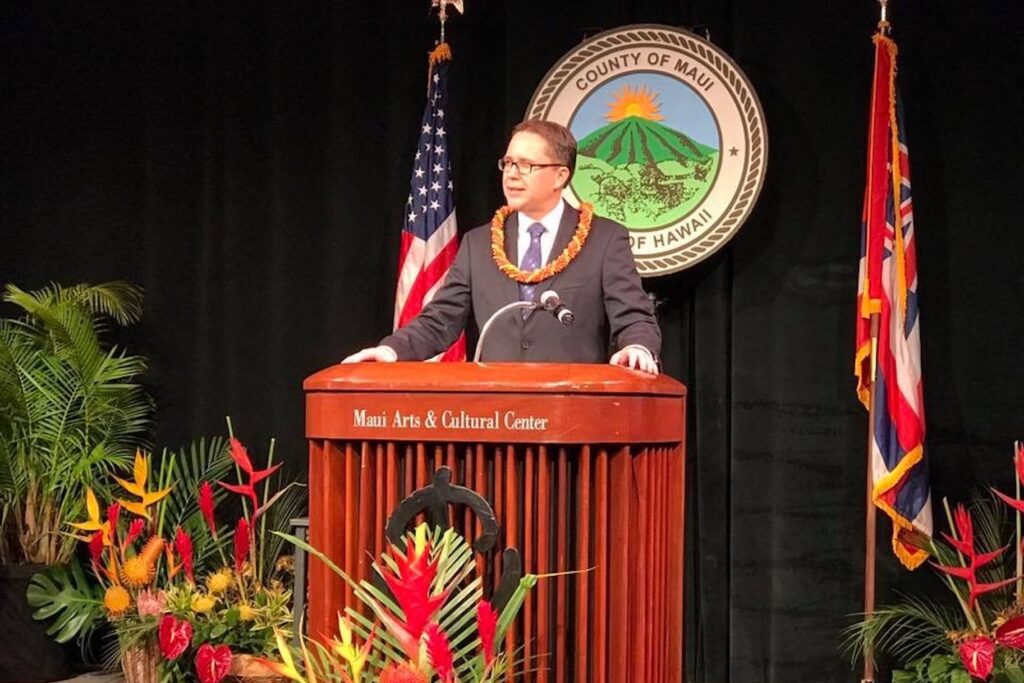Anyone who has visited Hawaii will call it a paradise — a place that seems impossibly distant from calamity or tragedy.
But on August 8, 2023, wildfires broke out on the state of Hawaii, particularly overtaking the island of Maui. Lahaina, a gorgeous, historic town that at one point served as the capital of the Kingdom of Hawaii, drawing in hundreds of thousands of visitors a year, was devastated by the shocking disaster.
Currently, the official death toll stands at 115, with many still missing, according to The New York Times. Thousands have lost their homes. Culturally significant buildings with centuries of history behind them have been razed. Almost every resident of Maui has been touched by the wildfires, as they watched a part of their island burn to the ground.
“It’s heartbreaking,” said Keith Regan, an alumnus of the USC Price School of Public Policy. “Just a horrific tragedy.”
Regan previously spent more than 30 years on Maui, and his wife has had generations of family members grow up on the island. While he now lives on Oahu, he keenly feels the pain of the destruction the wildfires left in their wake.
“To think of the tragic series of events that has occurred, it saddens me. It’s such a beautiful place, and there’s a lot of culture [and] history that is gone forever. I have friends and families that have lost their homes,” he said. “It’s going to take a long time for that community to get back on their feet again, and it’s never going to be the same.”
Regan is touched, however, by the people across Hawaii who have banded together to support the wildfire victims — donating food and essentials, opening up their homes, searching through debris, offering mental health aid and more.
“They’re literally giving the clothes off their back. It says a lot, I think, about Hawaii just generally as a community willing to step up when they see a tragedy like this occur and do whatever they can to help those in need,” Regan said.
As the state comptroller of Hawaii, Regan also has an important role to play during this time. It’s a position he reached after obtaining his Master of Public Administration (MPA) online, as well as years spent serving Hawaii (he was previously the finance director and managing director for the County of Maui and the chief administrative officer for the Hawaii Tourism Authority, among other roles).
“What inspired me to pursue my master’s degree from USC in public administration was really to open my mind and to better understand what is needed in order to better serve the public. My career has really always been about public service. I wanted to gain additional knowledge that would help me do my job better, to hone my skills, and USC really helped me with that,” Regan said.
Those public policy and management skills have been crucial to his work, as Hawaii is still reeling from the aftermath of the wildfires. Today, Regan is primarily focused on logistics and warehousing as emergency supplies pour into Hawaii.
“We’ve been able to go into the community and identify appropriate properties that would be useful, specifically in the warehousing side, to store the goods and supplies that are coming into Maui,” he explained. “We secured those facilities for the state and county in order to utilize them going forward. Now they’re in full operation, they’re receiving supplies, they’re sorting the supplies and they’re making sure that they’re getting into the hands of the people who need them most.”
While locating and assembling properties to support community needs is Regan’s primary function, he has taken on additional tasks to aid volunteer services in West Maui that are working to restore the region. It is an effort anyone can contribute to, Regan added.
“My biggest fear is that, like every other natural disaster, it ends up in the media cycle and then people move on to the next natural disaster. [It] gets forgotten,” Regan explained. “There are multiple organizations that are stepping up to help support [Maui recovery efforts], and if people can afford to make a contribution toward those efforts, it’s going to help because people have lost literally everything, and the economy is in shambles right now, as the Maui economy relies heavily on tourism.”
Millions of people have visited Hawaii and admired its breathtaking beauty, experienced its vibrant culture and been welcomed by its residents. Now, Hawaii needs help from those same people — including the Trojan Family — as it rebuilds.
“The people of Hawaii, of West Maui, who have been impacted by this tragedy are no different than your neighbor. This could have happened anywhere in the country. They need help and support not just from people in that local community or even the state, but also from those across the country,” he said. “The people of West Maui, of Lahaina, have so much aloha in them and have lost everything. And now it’s our turn to share that aloha back.”
Support the Hawaii Community Foundation and Maui Food Bank today.


